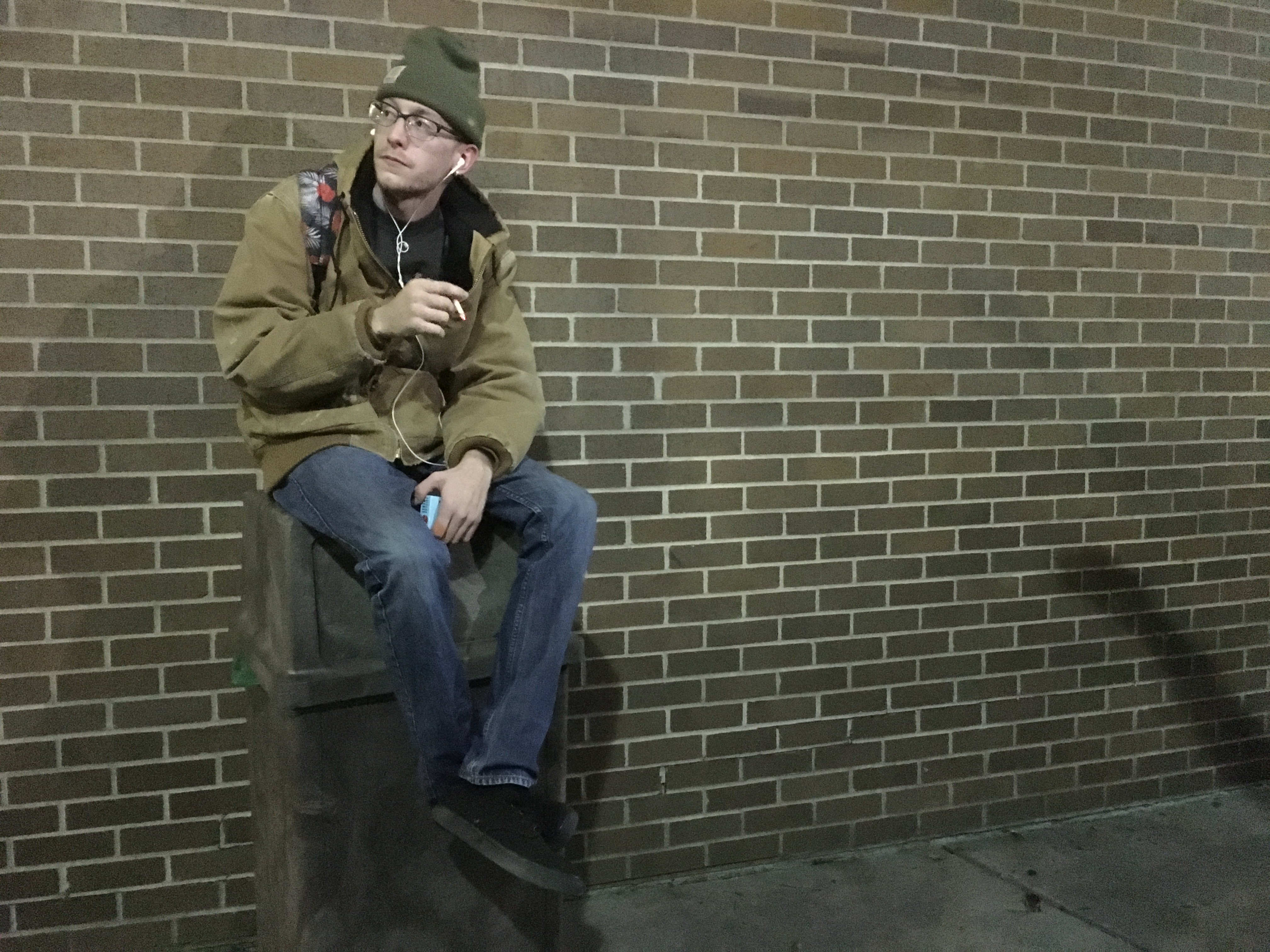Newswire photo by Savin Mattozzi | Clayton Houdeshell (above), a second-year Private Interest and Public Good master’s student, grew up in one of the many small towns ravaged by the opioid epidemic. He spoke with Copy Editor Savin Mattozzi about what it was like growing up in Tiffin, Ohio, surrounded by the crisis of addiction that kills approximately one person every 16 minutes.
Clayton Houdeshell stood behind University Apartments, occasionally puffing on a cigarette. He is thin with a short blonde beard. His half-rim glasses frame his bright blue eyes. Smoke from the cigarette curls up into the fall air.
“Dog food is what we call it… it turns you into an animal.”
Houdeshell, a Private Interest and Public Good (PIPG) master’s student, is from Tiffin, Ohio, one of many towns in the Tri-State area that has been hit by the opioid epidemic. A recent Cincinnati Enquirer investigative report revealed that heroin and other opioids kill one American every 16 minutes, which is higher than deaths related to road accidents. The pattern is consistent and familiar: A town once a hub of industry saw it’s employers pack up and leave for cheaper labor in other countries. American Standard, a porcelain manufacturing company, had a plant in Tiffin but left in 2007, leaving 650 workers without jobs.
According to Houdeshell, after the plant closed, people lost morale. Paired with this lack of morale, people suddenly had a lot of time on their hands.
As Houdeshell recalls, people started using prescription pain killers, and it progressed from there. People’s medicine cabinets were getting robbed. Heroin hit Tiffin when Houdeshell was in high school, between 2008 and 2012.
During his freshman year at Heidelberg University, Houdeshell was hanging out with one of his friends when his friend’s uncle pulled up and invited them to ride with him. They got in the car, and Houdeshell sat in the front seat next to his friend’s uncle. After some conversation, the uncle found out the Houdeshell is from Tiffin, a town that had already gained notoriety for its heroin use.
The uncle then grabbed a couple of baggies of heroin and placed them in Houdeshell’s hands.
“It was that real moment of ‘this has killed people that I know,’ and that’s when I realized that I’m hanging out with the wrong people… when it comes to my relationship with it… I’ve touched it, and I can say that it was just as numbing with that (bag) in my hand, with that little bag that separated the powder from my hand. It was just as numbing to hold that in my palm as it was to hear that my friend had died.”
Houdeshell and some of his closer friends stayed away from heroin by smoking pot.
“You can still do pot and do your homework,” Houdeshell said. “You can’t do heroin and do your homework.”
Still, some of his friends were unable to avoid the consequences of heroin. His friend’s girlfriend went to a hotel that was notorious for being a place where people used.
“My buddy’s girlfriend at the time had apparently done heroin there, and I remember him looking at me and saying ‘What the f**k do I do?’ And I couldn’t imagine being a parent. What the f**k do you do? It’s not that I don’t want to have kids,” Houdeshell said, “but I’m also worried that if I end up back in Tiffin, why the hell would I want kids if I’m going back to the same situation that I’ve experienced things? I don’t want… I hate seeing little kids around that. And it goes on in Tiffin, it goes on in Cincy, it’s everywhere.”
Houdeshell questions if America is ready to solve the opioid crisis or if+ enough people care to fix the crisis.
“I don’t know if America really wants to fix the problem. Why? Why would you care? I feel as if there are certain people out there…,” he said. “I can’t tell people to care about the issue. I can’t teach you what it’s like to care for other people.”
Despite this view, he thinks the best way to start solving the crisis is to be open about drug use and to not shame people into not doing it.
“There’s nothing to be ashamed about. If you’re having drug issues, there’s nothing to be ashamed about,” Houdeshell said. “It’s gonna suck. It’s gonna be one of the hardest things you’ll ever do in your life, to come out and say that you have a drug problem. But it will be the most revealing thing. And it’s not gonna get any better unless you talk about it. And you’re not going to make your family better by shaming your uncle or your mom or your sister. Talk about it. Let’s figure it out. We can do it.”
By: Savin Mattozzi ~Copy Editor~












